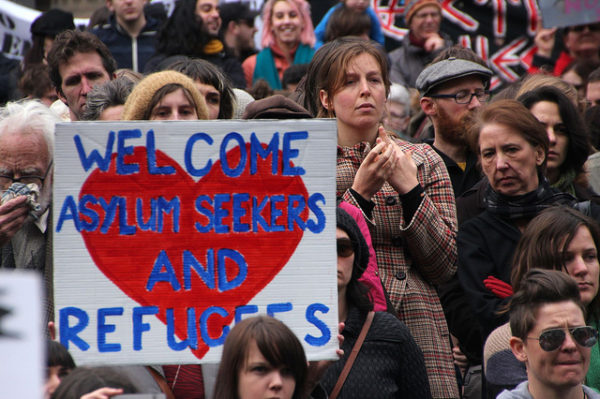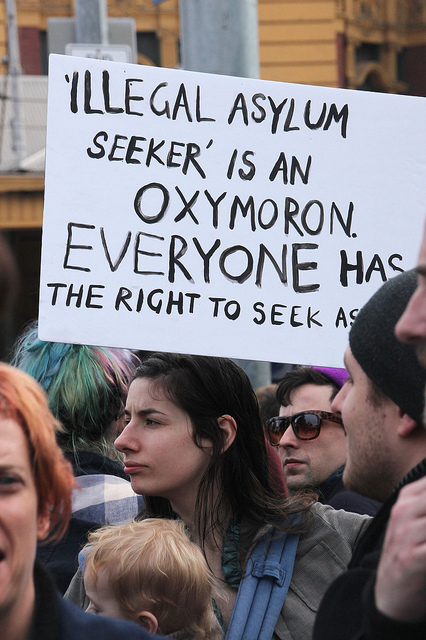Let’s begin by discussing political asylum per se. Afterwards I want to get to the core problem, the abuse of the term “refugee” while pushing for a path to citizenship for scores of migrants that wouldn’t qualify.
It’s the elephant in the room: the meaning and procedures behind the granting of asylum seldom get any attention.
As you’ll find out if you follow me in this journey, I needed only a little effort to unearth some gems of social justice extravaganza.
I’ll use my country as a reference point, not only because it represents a faithful representation of all the excesses of a leftist cultural-industrial complex, but because over the last few years Italy has become the main port of entry to the European continent for economic migrants, i.e. people posing as refugees.
Excesses, I was saying. Italian judges for instance granted protection both to someone who claims to be fleeing from a terrorist group and to another guy who is part of said group (or, as they put it in their apologetic paper-pusher lingo, he’s “registered” with them).
I also discovered that an extremely dangerous journey from Africa to Europe is a good thing, since it increases your chances to stay.
What about the revelation that obtaining a temporary form of protection (theoretically to be followed by repatriation) is often motivated, in no small part, by the visible attempt on the part of the applicant to become part of Italian society…?
My line of reasoning, as you’ll see, may be described as a little too linear and unsophisticated. Do we really need to state the obvious? Apparently yes, we do. That’s where we got now: fighting against those who deny the obvious.
First things first. It’s called political asylum.
It’s not called war asylum, let alone economic asylum.
It’s an institution based on fundamental principles of justice. But it needs to be applied taking into account the practical constraints of the real world. It shouldn’t be strained to become something else.

Please, oh please, look at the faces! (Rally in favor of refugees in Melbourne, Australia, where the repel policies are quite strict). Photo by Takver (CC BY-SA 2.0)
Let’s dig in.
Take Switzerland during the 2nd World War.
From 1940 to 1944 they were surrounded. The entirety of Continental Europe bordering the country was either a war theater or part of / occupied by the Nazi-fascist regimes.
Even ignoring the Iberian Peninsula with its authoritarian -but formally neutral- regimes and the astonishingly oppressive USSR, and of course ignoring distant parts of the world like Africa were war and human rights violations were significant, according to today’s typical interpretation of the right to asylum the Swiss had a sort of moral obligation to welcome any wannabe refugee, on grounds of basic essential protection for human life. They’d be required to let the whole continent in!
Additionally, consider: since nowadays it’s taken for granted that anyone coming from the war zone of Syria deserves to be taken in permanently, this means we’re accepting as future citizens of Europe thousands of Muslims that openly support Isis, i.e. the Islamist terrorist group that is causing the war to continue, openly hostile to our civilization and hell bent on submitting us all, if only they had the chance.
This borders on insanity!
Realism (and the results of a number of telling surveys on political opinions) tells us that at least a majority of the not openly Islamist Muslim refugees would either support or avoid opposing any Islamist suprematism in Europe.
Imagine the Swiss accepting lots of new arrivals from Germany daily, including many fervent Nazis, with the rationale that they deserved to be spared from the horrors of war!
Who wouldn’t call that an ?
There’s no such a thing as a right to asylum from wars. Let alone pushing your absurd crusade against “discrimination” to the point of ignoring any distinction between aggressors and hapless victims, or pretending not to notice that a certain group represents a danger to your community.
Political asylum was originally meant instead to protect some special cases like political activists who opposed a certain regime, but it was naturally extended to an entire oppressed people, be it due to social, religious or ethnic reasons. Like, say, the Jews in Nazi Germany.
Wait. Thousands of Jews tried to flee to Switzerland in fact!
Some succeeded (at least more than half of them), albeit without obtaining the recognition of political asylum, others (10 to 24 thousand?) were refused entry.
Had the authorities given the green light, probably many more Jews would have tried reaching Switzerland. Avoiding the death camps!
This is indeed a good example of a situation in which -in order to call yourself civilized- you’d have to try and save their lives. Call it justice, call it love of humanity, or maybe a Christian call to treat others as brothers. Whatever the rationale, this would be a cornerstone application of the institution of political asylum.
But! consider also that the Swiss had their reasons to try not to take sides, to the point of not helping the victims of Nazism.
It’s an accident of history that the neutral Switzerland, surrounded by the Axis powers, wasn’t conquered but managed to survive unscathed. There were indeed invasion plans.
Lofty principles cannot be applied ignoring the practical implications and the means employed.
Would you demand a friend to go and rescue some strangers, if in order to do so he’d have to cross a large clearing under sniper fire?
Switzerland will always be remembered as one of the countries that refused to help Jewish refugees. And yet we shouldn’t be too hasty in playing the blame game. It’s not that easy.
A realistic approach to today’s emergencies. Syria.
Asylum shouldn’t be about wars, then. And even when facing turmoils, oppression, civil wars or entire populations targeted for elimination, it’s not that easy to put theory and practice together.
Besides, it’s not like a fundamental principle should apply only to those cases that the media circus chooses to cover, or to those very few people who happen to reach the civilized world through a perilous trip in the hands of criminals.
Interacting within the context. If your nation is in condition to grant asylum -as a human right- to more than a handful of people, it should also be capable of other forms of intervention, including a military mission designed to block or limit the causes of the mass flight.
Again: when a region is in turmoil it’s your duty, before even considering granting asylum to people coming to your country, to try and create the conditions to help secure the theater, create shelters and accommodations meant to be temporary, and only as a last resort move people permanently. If that’s the case, of course, their interest is to be kept in the region if possible, not hauled to a different continent.
Take Syria as an example.
Your first priority is that of blocking aggressors, ending wars, even taking an active role if necessary.
Bombing Isis is way more admirable, noble and compassionate than welcoming Syrians in your country and teaching them your language. (This is a fundamental truth even before putting in the equation the risks and criminal activities involved in the migrant smuggling.)
You may object that by doing that you’d help Bashar Assad.
But here’s my point: if you really want to be the good guys
1. you should take on responsibilities. Which includes getting your hands dirty, running the risk of becoming an accomplice of the bad guys.
It’s true that Assad’s victory could have some negative consequences, we can’t be naive and depict his reign/presidency in rosy colors; but remember, any decision, including the idea of taking in hundreds of thousands of refugees, carries significant risks.
Syria’s situation is improving, restaurants are opening, people try to get back to life; all of this is made possible by the almost completed defeat of the Islamist rebels.
Unfortunately western governments did the exact opposite of what seemed wise: supporting the latter -thus increasing the level of division and destruction- while launching a few ‘mosquito bite attacks’ on the legitimate government, further destabilizing the region (and their relationship with Russia). On top of all this they still burden the population with a counterproductive and crippling embargo.
2. We’d need to pressure the rich Arab Gulf states to do their part and take in those refugees who share their culture. It’s unacceptable that they play dumb and don’t shoulder any burden, or even worse, they finance fundamentalist mosques all around Europe, to help radicalize the Islamic migrants they’re happy to view as vanguards, sent to colonize us.
Again: since this solution is bound to bring about a better result overall, it’s more just and noble than welcoming an indiscriminate mass of refugees in Europe. In fact the merits of a given choice have nothing to do with our egocentric, misplaced sense of guilt.
As a conscientious objector many years ago I decided to leave a mark by refusing to become a soldier or use guns. Honestly I don’t know if I’d make the same decision today. But I always considered nonviolence a hard choice; not for everyone and never to become a reason to antagonize those who rightfully take the responsibility to defend, which of course often requires the recourse to lethal force.
Therefore, even if personally I can’t possess weapons and I may have to pay a price for this, as an observer of international events I can’t and won’t join the camp of utopian pacifists who damage the cause of peace by disarming or hampering the efforts of the good guys -OK, let’s say the least evil guys- thus empowering the worst bloodthirsty monsters.
Additionally, remember: once you establish an automated process for asylum, ignoring the feasibility of the effort, the motives of those creating the crisis and the long term consequences of your actions, you’d be creating a perfect opportunity for ethnic cleansing! What a nice incentive: if I start persecuting a certain minority, I can count on them fleeing to the Western World where they’ll settle, problem solved. And since the precious European snowflakes abhor war, they won’t even retaliate/start a military campaign against me, at least inasmuch as the pacifists have their way.
A perfect storm for the worst oppressors!
Take Nigeria (pop. 200 million).
We’re being flooded by op-eds and magazine covers on the Mediterranean migrant dinghy crisis. Meanwhile in Nigeria a horrible bloodbath is destroying the lives of thousands of Christians, day by day, and only a handful of alternative media outlets care to report on the subject. The Islamists are extending their territory further south and now control a portion of the central region, their dominion based on fear, death and burned villages.
Is it acceptable to remain cool and detached while witnessing such actions?
Welcoming a handful of Nigerians who were able to travel such a long distance to get to Europe could hardly make any difference for the country.
Additionally, even if we considered the idea of taking in many millions of refugees, what would we accomplish?
The indiscriminate approach to problems championed by the Left would cause us to grant asylum to southerners who, coming from the richest region -and already among the well-to-do themselves, at least for Nigerian standards- may want to come in the vain hope of further advancing their status. And yet this emergency has nothing to do with them.
We’d also run the risk of welcoming both the victims and their persecutors. (Even if you choose instead to discriminate, it’s not that easy to catch those who lie about their condition.)
At any rate, even if you were able to rescue all the persecuted populations -in this case the Christians from central Nigeria- why would we want this to be a permanent solution? Shouldn’t we prefer a form of resettlement within the country, giving them hope of a return, also possibly a support if they want to defend themselves instead of fleeing…
Should we send this kind of signal to Boko Haram and their ilk?
No, political asylum can’t be seen as a shortcut to a solution. Barring a few exceptions, it’s invoked by people who find in it an opportunity to demand that our governments do something without personally paying any price.
A moron with her oxymoron.

Photo by Takver (CC BY-SA 2.0)
Take this protester from the photo. Her poster asserts that everyone has the right to seek asylum.
Does such statement make sense?
Assuming you’re not trying to game the system (e.g. applying for asylum, then disappearing)…
If you’re not entitled to this form of protection, what is the point of seeking it? That would just be a waste of time.
Fleeing from persecution is a condition that should leave little legroom from interpretation. It’s not about trying to see if you’re eligible. It shouldn’t become a lottery, possibly based on the political bent of a judge or committee.
Therefore the rationale behind this approach is: every single one of the aliens coming here (insert your country’s name) illegally should be granted asylum. Since this idea doesn’t make sense it’s protected through the thin veil of giving them a chance. A fig leaf.
The beauty of this approach that prioritizes a dialogue on the right to put a received wisdom into question over the content of said wisdom, is that you can skip the substance altogether and fixate on posturing and vague general appeals to rights. Once the foot is in the door the Left proceeds to change the X policy, then suddenly declares the issue settled beyond discussion. A brilliant -yet diabolical- trick. Avoiding any discussion in the name of discussion.
Similarly here: opening the doors to asylum for all as the only acceptable option while putting a lid on any critical analysis of the concept.
Asylum as a luxury
We’re being generous with migrants, and maybe rightfully so, because our societies have become very rich.
An extended welfare state based on unsustainable amounts of debt has convinced most of us that you can guarantee bountiful handouts and benefits to anyone, paying no visible price.
We’d feel bad not to spend something also on the less fortunate coming from abroad.
What may be portrayed as a dispassionate application of justice is more aptly described as an act of generosity.
Don’t expect this attitude to last if when our economies will crumble down over the weight of debt.
The sad part of the story: people can’t keep their cool in times of crisis. Once things turn sour we (Europeans) will become a nasty and vengeful shadow of what we were. Especially since we’re already unfairly attacked as xenophobes now. Cry wolf enough against racism and people will become those horrible racists you ranted so much about.
Instead of obtaining a recognition of the fact that
1. our society produced spectacular results, theirs doesn’t work (since they need to come here!), therefore there must be something wrong with their culture;
2. they should be grateful for the opportunity given;
we’re being kept hostage of a toxic narrative, according to which:
1a. our society and culture deserves to be demolished, plus it’s the root cause of their problems; we should instead protect and nurture their cultures, thus transforming our society accordingly;
2a. they’re entitled to anything they obtain from us and then some; any resistance or objection to the ingratitude of immigrants, any concern for the crime increase is just further proof of our racism.
This is a recipe for disaster.
Getting back to the 2nd World War, let’s remember those thousands of citizens of the USSR and other Eastern Europe countries controlled by the Soviets who were found in the West at the end of the war and were sent to the other side against their will, even if everybody knew they were prime targets for abuse, deportation and elimination by the state.
Some were even sent in lead-sealed trains to prevent them from escaping.
Talk about a right to asylum! This is precisely the kind of outcome to expect when political opportunism, weaknesses, unholy alliances suggest you shouldn’t care about the lives of millions of people.
Let’s stop pretending the world could be regulated through a special blend of jurist opinions and emotional appeals to solidarity. The root of International Law is the law of the jungle.
Being well aware of those limitations and choosing reasonable goals could help limit the damage. We shouldn’t push our luck.
Someone cunningly noticed that the whole point of the current progressive culture is an astonishing total reversal of priorities.
Universal values, moral principles that make sense only through their general application in a society, have been redefined as a personal choice, necessarily optional.
On the contrary attitudes that are by definition expressed by an individual, like compassion, have been morphed into an absolute imperative for impersonal state entities.
Here’s how the rule of law, the concept of citizenship, protecting the borders have been relativized, on the contrary the moral obligation to welcome has become absolute and unquestionable.
The other asylums: the Subsidiary Protection
Since the status of refugees is defined by a couple of UN treaties as involving only individuals who may be persecuted in their country this is seen as too restrictive by many. Hence the EU created the Subsidiary Protection: a further opportunity for people seeking asylum for broader reasons, including fear of punishment, risk of inhumane treatment, risks associated with wars (including civil wars). This protection may be revoked -in theory- when the problems behind the decision cease to exist (e.g. a war is finally over).
This protection is often applied to people fleeing from law enforcement, unless the alleged criminals is considered guilty of a serious crime or at any rate dangerous for the society (terrorists for example would be excluded, but this is mostly academic anyway since known terrorists would never apply, unknown ones would never disclose their past).
It’s important we realize through this route people may obtain a residence permit for trivial reasons, or simply by making up a good story: for instance you could simply assert you’ve been unjustly accused of theft.
If -as it’s almost invariably the case- you come from an underdeveloped country, there’s a risk you may fall in the hands of a penal system that cannot guarantee the adequate level of treatment we’re used to in the Western world, be it during the trial phase or in prison.
Therefore by playing it smart you can obtain protection. Notice how it’s unthinkable to be able to investigate the minor crime brought to attention (of course nobody comes up with: “I’m fleeing because I killed my neighbor with a machete”). The crazy implication: you could have made up the entire incident, or maybe you were indeed accused while innocent… but you could also be a thief; it really doesn’t matter!
In a different official protection granting decree I picked up at random we can find what appears to be a typical formula for such documents: the judge considers
the story told by the applicant to be truthful, even while not corroborated by external evidence, since the narration was sufficiently detailed, coherent and plausible
Got it? All you need is the ability to tell a convincing story.
I must add that I’m not asserting all those stories are false; I believe there must be a kernel of truth in the majority of them.
We must also acknowledge the challenging nature of the role of those who are called to rule based on the flimsiest evidence.
But let’s not kid ourselves: all that doesn’t glitter is not gold.
The other asylums: the Humanitary Protection
This further opportunity has been reserved for those who don’t qualify for the other two categories but obtain a temporary residence permit due to “serious reasons of humanitarian nature”.
This vague formula could be (and is) used to justify all sorts of interventions, including protection for alleged global warming refugees…
It’s a humanitarian initiative that was basically adopted only by Italy; (I dare to say) you should care even if you’re not Italian, since my country in the last few years has become the default port of entry for the entire Europe.
As I said this is meant to be temporary, but don’t hold your breath waiting for any protection expiration to cause expulsions of migrants from the continent.
I tried to dig a little. Even the first random ruling I stumbled upon contained typical elements of the average narrative: a nebulous conglomerate of the most diverse and ill-defined problems, including the young age of the applicant, health problems, lack of family ties, widespread poverty in their home country… Such a humanitarian charge cloud, undetermined just like the position of an electron within the atom, is instrumental in making the content of the ruling practically unchallengeable and final, since there’s no single point of failure or verifiable facts in the document. It’s clear though that the object of provisions like this is helping the so-called economic migrants.
Realistically: neither Italy nor any other country could accommodate so many millions of migrants as to be able to make a difference.
Interesting: among the motivations that could earn you this form of protection we find
A. the risks and perils suffered during the trip,
B. the observation that
the applicant has shown a significant interest in becoming integrated in the Italian society, since he proactively participated in the reintegration (sic!) activities that were offered by local authorities and voluntary organizations.
Got it?
A. Paradoxically it’s beneficial for migrants to risk their lives crossing the desert, then spending months in the Libyan war zone in company of criminals, eventually almost drowning in the Mediterranean: come on, would you really reject (and send back) someone who went through all that? Don’t you have a heart?
Once again good intentions bring about evil results. That’s what happens when you mistake behaving as a nice person with doing good.
B. Can’t we appreciate the irony in considering the will to integrate in a new country (as described by activists and social workers that have a vested interest in taking the side of the applicant) as a good reason to grant a temporary residence permit?
Should we expect a few more years spent perfecting this integration to culminate with a return ticket to the fatherland?
Not to mention the absurdity of the idea that an illegal immigrant acquires a right to protection that will eventually morph into a citizenship thanks to some generic personal problems but mostly because, once put in a reception center/hotel, instead of spending the entire day doing nothing, he agreed to be present where the volunteers were holding some entry level courses? I mean, since you’re already there… It’s easy to get bored.
This is a subject few people talk about
Considering the aforementioned legislation, plus the reality of deportations that consist in a useless paper slip inviting the subject to leave the country; considering the general atmosphere in Italy where enthusiastic promoters of this migration wave were met by a resigned acceptance in the populace, up until now anyone who failed to obtain some form of protection could still remain indefinitely as an illegal, even if already convicted and considered dangerous.
(I bet if you’re not Italian and I emphasize this state of affairs isn’t limited to my country you’ll be nodding with a bitter smile.)
Even better, obtaining a ruling in your favor meant you could rest assured you’ll never leave the EU, often completing the process with a family reunification.
There’s no significant filter to speak of anymore.
Let’s wait and see what Salvini, Orban & Co. are up to, trying to reverse the trend.
I was impressed when researching for this article by the sheer amount of (never heard before) websites and associations devoted to facilitating the migration wave. With evocative names like Melting Pot Project, the look and feel of well funded operations, gifting the world with huge amounts of material: documents and guides helping those who want to apply for asylum, annotated copies of the rulings, militant op-eds, thematic news feeds and so on.
A small universe most of us never got wind of.
Thousands of well-prepared activists, millions of work hours, with no opponents in sight nor receiving any direct and documented criticism. They’re practically the only people who dabble with the technicalities of asylum. They’re the noble no profit good Samaritans who’d do anything to maximize the number of refugees.
They’re the brave paladins of “no human being is illegal”. Who genuinely think that even those who commit a number of crimes should be understood and justified because society.
It goes without saying: those volunteer groups insist the authorities are rejecting an excessive number of applications.
Let me put down this little note on the subject nonetheless.
In this specific case, granting refugee status to a homosexual who fled from Nigeria, alongside the sound assessment of the need to protect from incarceration, we find a number of rash assertions, highlighting the dangerous precipice chosen by today’s jurisprudence:
it is this judge’s view that the social stigma associated with sexual orientations considered unorthodox in homophobic countries constitutes in itself -that is, regardless of the present and factual danger of incrimination- a form of persecution justifying the need to recognize the right to the maximum form of protection.
Most people still fail to grasp what could become of a civilization that treats the so-called homophobia as equivalent to the worst forms of persecution.
This extreme prejudice against an alleged prejudice is further shielded from criticism because it’s being pushed through the power and authority of the judiciary.
Protecting someone even when you don’t buy their story
Very little effort is needed to unearth embarrassing examples of how this whole asylum process has become a farce.
Imagine what a powerful media outlet making good use of investigative journalism could have found, if this little teddy bear with no means came this far…
In some cases the dangerous trip excuse was even sufficient to obtain the 2nd level, subsidiary protection: in fact a woman who “consciously or not” embarks in such an insane plan to cross the sub-Saharan Africa “where survival itself, for an unaccompanied woman, borders on the miraculous” (sic!), deserves to be assured you’d never send her back…
Notice that this ruling has nothing to say about seafaring and dinghies: the risks and the violences are already present before reaching Libya, thus demonstrating that any plan to secure their passage through an even larger involvement of NGO ships, even if they were to pick up migrants on the Libyan shores, wouldn’t solve anything.
Also worth dwelling on: protection granted
even if her story doesn’t sound credible and is lacking in detail when recollecting her falling prey of human traffickers and sexual exploitation
In other words: we acknowledge the existence of this ugly traffic and of systematic rape, but these things are to be incentivized, since we reward those who expose themselves to such abjections.
Plus of course we greenlight asylum even when we don’t believe the applicant is telling the truth!
Two dogs strive for a bone and a third gets badly bitten.
We could describe the following situation as tragicomic. To me it’s just depressing.
Two distinct asylum requests from two Nigerian citizens:
Case A, subsidiary protection granted: he fled from the country because he was -allegedly- threatened by the armed group called Niger Delta Avengers.
Case B, political asylum granted: he fled because he was “registered” (sic!) with the Niger Delta Avengers.
I wonder what kind of paperwork is required to register with a paramilitary group…
Ahh wait, his uncle is one of the local leaders of this rather new and little known group.
They’re fighting against the government by launching attacks on oil wells or by kidnapping petroleum corporations employees. Those little rascals!
Since Nigeria is really huge and it’s a conglomerate of many different regions and ethnic groups that tend by nature to antagonize each other, the discovery of substantial oil deposits on the coast became an opportunity for division and turmoil. Some of those southerners, mostly fishermen, are now trying to stop the extraction process, or at least the wealth transfer to the rest of the country. Wait. Isn’t this how xenophobic chauvinists operate? They sound a lot like the worst right-wingers, right?
But seriously, we could just call them terrorists. Or maybe not: you just need to insist on the corruption of the central government, pepper the presentation with some green anti-pollution rhetoric…
I must add there’s no guarantees the other applicant was genuinely persecuted by those terrorists. Maybe he made up his story.
It’s convenient, if you live on the south coast and you couldn’t pass for a credible migrant from the northern regions infested by Boko Haram (because you don’t know the languages and places), to be able to find some episodes of violence closer to home, to put to good use when trying to move foreign authorities.
At any rate the idea seems to be that we should welcome both, even if they’re enemies, hoping they’ll leave their past behind.
Is this reasonable?
Of course those rulings came from two distinct tribunals. Nonetheless the question still remains. Should we import warring factions into Europe, thus rebuilding here the very tribal divisions and conflicts that forced those people to run away?
Hard data: how many of the illegal immigrants are genuine refugees
I’m again referring to Italy here, since we’re at the epicenter of the smuggler-driven migration phenomenon.
As you can imagine the mainstream media here follow the very same script used in the rest of the western world. They typically refer to refugees as the only visible reality, as if they were representative of the whole. That’s how a failed policy based on justifying illegal immigration is shielded from criticism. Even when it’s clear that the goal is that of taking in an unsustainable amount of migrants.
Here’s the latest data from the Italian Ministry of the Interior.
| Outcomes in % | 2016 | 2017 |
| Refugees | 5 | 8 |
| Subsidiary Protection | 14 | 8 |
| Humanitarian Protection | 21 | 25 |
| Denied | 60 | 58 |
The refugees represent a small minority. The other types of protection are really stretching it.
Also according to the Ministry there’s a very small number of applicants coming from war zones.
By outlining a dependable policy focused on rejecting illegal immigrants, plus choosing to examine the applications only through a number of local centers (think of African consulates for instance) we could drastically reduce the human trafficking, bring the number of deaths close to zero, while at the same time giving adequate protection to that 10% or so who, at least according to our present, generous interpretation, deserve to be protected. This approach could prevent millions of people from coming in strict contact with criminals and mafia organizations, as is the norm right now. When illegality is tolerated a can of worms is left to fester: think of the Nigerian migrant women, the vast majority of whom have no choice but to become prostitutes.
With the suggested strategy the number of new arrivals would also become more manageable.
But I can’t stress this enough: our priority would be that of keeping things local, emphasizing the right to return, with non-traumatic resettling as the fallback option.
A new and improved understanding of the problems should also reject the fallacious idea that we shouldn’t discriminate.
As an example of what such idea facilitates, consider that while the Syrian crisis was at its peak the vast majority of the refugees coming to Europe were Muslims, notwithstanding the fact that the Christians were the party mostly at risk. And this was due to the fact that the persecutions were still in place within the UNHCR camps, therefore the Christians had to fend for themselves and had little opportunity to seek international help through the UN.
To hell with PC policies. Discrimination is a good thing. Providing it’s applied correctly.
Let’s be generous and welcome real refugees, taking care of their transfer if necessary, instead of welcoming only those who had the means to travel for thousands of kilometers on their own.
This could make the difference, saving religious minorities in the Middle East, including Christians.
We should also prioritize the taking in and integration of Christian refugees in Europe. To an extent that should be visible and obvious to any observer.
As I said earlier, providing there’s a will to do so, rich Islamic countries could easily accommodate a very large number of Muslim refugees, if ever needed.
Realism is key: our goal must be an attainable . But of course, if all we do is renege our roots and nullify our cultural traditions there’s no point in blabbering about integration. Disintegration is the word.
Updates.
1. Austria follows my suggestion. 2. Another example of laughable asylum motivations.
1. A surprising convergence with what I was saying. Austria, through their role as temporary president of the EU, is pushing a proposal to examine asylum requests only outside of the continent. This would stop most of the smuggling. It goes without saying: such a plan isn’t easy to pull off and it implies some risks.
2. A disconcerting case seems to add further fuel to my conclusions regarding the lack of objectivity within the judiciary commissions that are tasked with examining the applications.
A migrant who has already obtained humanitary protection for health reasons happened to injure himself while trying to flee from the police. The agents wanted to verify if he had any contagious disease, therefore they asked to know what type of medical emergency earned him the right to stay in Italy.
Turns out he’s suffering from meteorism (gas in the abdomen) and flatulence (passing wind)…










































